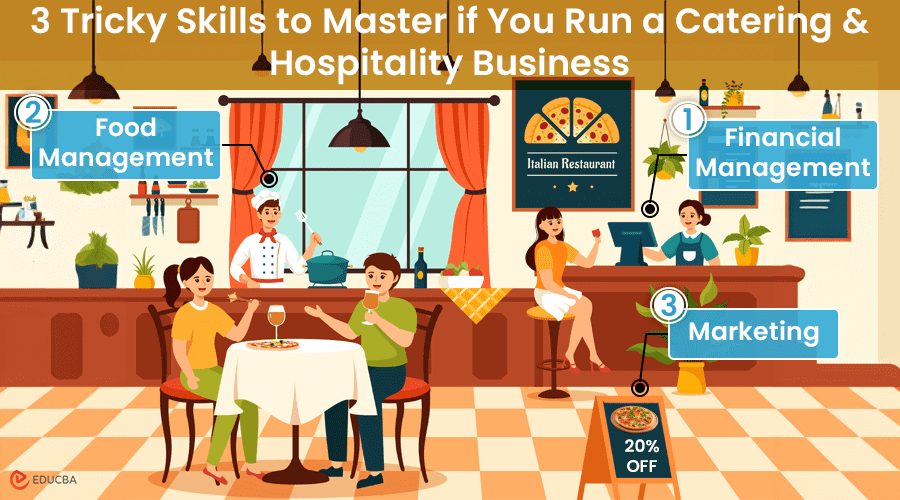Why Do You Need Entrepreneurial Skills in Catering & Hospitality Business?
From an onlooker’s perspective, catering and hospitality businesses are all about creating nourishing food, providing a memorable dining experience, and establishing a thriving business, all while having fun. However, running a successful restaurant involves much more than serving good food. The path to success is multifaceted and requires entrepreneurial skills in catering, like strong business acumen, people skills, and creative flair.
If you can nail these three skills, you can transform your business into a thriving establishment. Whether you are a veteran or a beginner in the industry, here are the business skills you need to run a successful catering and hospitality business.
#1. Financial Management
Financial literacy is the bedrock of restaurant success. You need to understand basic accounting principles and manage your finances effectively. Here are the key areas to focus on:
➔ Understanding Financial Statements:
➔ Using Financial Tools:
Fortunately, there are a variety of tools, such as 3S POS, QuickBooks, and Xero, on the market that will make your life easier. These programs can help you create detailed sales, cost, and margin reports as well as pinpoint areas where you need to make changes.
➔ Food Cost Analysis and Management:
Food cost analysis and management is another essential part of a hospitality business’s financial management. This type of analysis deals with the costs of ingredients and labor, as well as menu pricing and portion control. Software solutions such as ChefTec by Repical streamline this strategy using recipe cost templates and inventory control on the back end.
➔ Creating a Profit & Loss (P&L) Statement:
Last but not least, you have to know how to make a P&L sheet that includes all of your expenses, from leases and payroll to, most importantly, food and marketing. Financial literacy aims to avoid future financial doubts by gauging the long-term financial sustainability of your restaurant.
#2. Food Management
Food management covers all aspects of food service, from planning a menu to procuring and preparing ingredients and ultimately providing a delightful experience to consumers.
Key Aspects Include:
➔ Inventory Management:
In food management, you must acquire essential inventory management skills. It means maintaining stock levels, storing raw ingredients properly so they do not spoil, and reducing food waste. Ensuring you learn how to use the 3S POS system and the inventory management system is key to keeping your stock in order.
➔ Menu Management:
Menu management is another key skill to have in this regard. It involves putting together a specialized menu based on the market analysis and the profit margins you aim for. Many restaurant owners and cafe operators use menu templates to design attractive and professional menus. These templates not only save time but also help ensure your menus are easy to update and visually appealing, whether you’re running a small food business or a larger establishment.
➔ Floor Management:
Next comes floor management, which deals with everything happening in the front of the eatery — serving food, taking orders, and dealing with customers. You must learn interpersonal skills to deal with your staff and customers for effective floor management. Leadership skills and knowledge of food safety and quality are also crucial in this regard. A great book to learn about these skills is ‘How to Talk to Anyone’ by Patrick King.
#3. Marketing
One of the biggest challenges for any restaurant is marketing, particularly in competitive countries. That is why it’s so important for you to learn both traditional and advanced digital marketing strategies.
➔ Traditional Marketing:
Traditional advertising channels for the hospitality business include billboards and flyers. You can also organize events and promotions to generate buzz and attract foot traffic.
➔ Digital Marketing:
In this advanced approach, you can use innovative new marketing channels, such as social media and Google PPC.
A great example of a marketing campaign is Burger King’s creative “Whopper Detour” campaign, where customers could get a Whopper for only a penny. The only catch was that the offer was redeemable through the Burger King app, and the user had to place the order within a 600-meter radius of a McDonald’s.
McDonald launched this smart campaign with the very clear objective of targeting competitors and increasing app downloads. The innovative tactic went viral and led to 1.5 million additional app downloads.
➔ PR and Online Presence:
In addition to creating and executing creative campaigns, you will also need to educate yourself on the fundamentals of restaurant marketing. It means increasing your PR efforts, like organizing media lunches and blogger events, and having a hook and pushing it through social media and TV.
The truth is that having an aesthetic and unique virtual front (website) is just as critical as having an attractive real front for your restaurant. Even though you might not be doing it yourself, you still have to understand the fundamentals of web development and SEO. Udemy, WordPress, and Wix are some of the tools that can give a complete understanding of how a website is created and operated. Especially in more competitive areas like wedding catering or fine dining, a professional website with good SEO can really make the difference.
Final Thoughts
In the catering and hospitality industry, success demands a diverse skill set. Managing your finances can help keep your business profitable and stable. On the other hand, when you focus on food management, you can run your operations smoothly and, in turn, keep your customers happy. Additionally, using creative marketing strategies, such as finding the right catering business name ideas, can help your restaurant stand out from the competition.
Recommended Articles
We hope you learn these entrepreneurial skills in catering to enhance your hospitality business. For more skill-based articles, you can check these resources.

